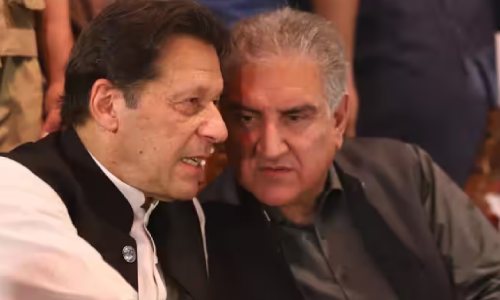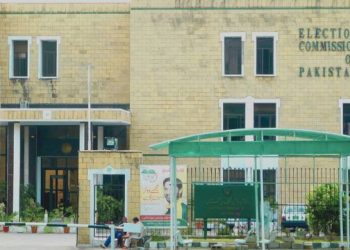ISLAMABAD: A special court under the Official Secrets Act has rejected the bail petitions of former prime minister Imran Khan and former foreign minister Shah Mahmood Qureshi in the cipher case.
During the special court hearing, PTI lawyers requested bail for Imran Khan and Shah Mehmood Qureshi, as well as pre-arrest bail for Asad Umar. The FIA’s assistant counsel suggested that the special prosecutors appear in the Supreme Court, with the hearing scheduled for 12 o’clock.
PTI’s lawyer mentioned that initially, the special prosecutors had proposed a 10 am start time for the hearing, and it wasn’t their fault if the fee wasn’t received.
Judge Abul Hasnat instructed the FIA’s assistant counsel to summon a special prosecutor, and others were expected to attend as well.
Judge Abul Hasnat Zulqarnain rejected FIA Prosecutor Zulfiqar Naqvi’s request for a 12 noon hearing and allowed PTI lawyers to present their arguments in the absence of Special Prosecutors. Special Prosecutors Zulfiqar Naqvi and Rizwan Abbasi left the courtroom.
Salman Safdar, PTI’s lawyer, stated that the bail application for the cipher case would take a maximum of 45 minutes. The assistant counsel for the special prosecutors re-entered the courtroom and requested a break in the hearing, to which the judge responded, “Take your time.” Therefore, the bail application hearing would proceed today.
Salman Safdar also noted that there were three different special prosecutors and that they should be allowed to present their arguments. The judge replied, “I want PTI lawyers and special prosecutors to present their arguments; I will listen to the arguments on the bail application today. If the prosecution does not present their arguments today, I will reserve the decision on the bail application.”
Lawyer Safi Babar Awan mentioned that Asad Umar had been included in the investigation in writing. Asad Umar himself came forward and stated that he had written a letter to the FIA, asking for clarification on when and where he should appear for the included investigation.
Babar Awan further pointed out that Asad Umar was not directly named in the cipher case. Asad Umar’s bail application was filed on August 22, and it had been a year since the investigation into the cipher case started in March this year.
The assistant counsel for the special prosecutors objected to the investigation involving Asad Umar, but the judge stated, “I will not hear that today, sorry, there will be arguments on the bail application.”
The assistant counsel for the prosecution argued that Asad Umar should have come to the FIA himself, and the investigating officer should not have approached them. The investigation into Asad Umar’s role in the Cipher case has yet to be completed.
The secret court judge pointed out that one bail case should not delay other bail cases. The assistant counsel for the prosecution said that Asad Umar should have been submitted to the investigating officer after the case was filed, but no investigation had been conducted.
Asad Umar mentioned that FIA had called him twice, once last year in December and recently, and FIA conducted an investigation for one to two hours.
The former Federal Minister stated that political revenge was being taken. Judge Abul Hasanat responded that if Asad Umar wanted to be investigated in the courtroom, it could be done, and the hearing would not be postponed. He added that decisions on the applications of Asad Umar, Chairman PTI, and Shah Mehmood would be made today, and as many applications as needed could be submitted.
The assistant counsel for the special prosecutors requested to hear the arguments on the three bails together, but the judge decided that two bail cases and one pre-arrest plea would be heard separately. He questioned why Shah Mahmood Qureshi was named in the lawsuit.
Special Prosecutor FIA Shah Khawar arrived in the courtroom and intervened during lawyer Salman Safdar’s arguments. He stated that there was no need for Asad Umar’s arrest yet, as there was no evidence against him. If any evidence is found during the investigation, Asad Umar will be informed.
Lawyer Babar Awan requested that the bail be confirmed if the FIA does not have evidence. Upon this request, Judge Abul Hasnat Zulqarnain began writing the decision in the open court on Asad Umar’s bail application.
Judge Abul Hasnat Zulqarnain stated that, according to the prosecution, there is still no evidence against Asad Umar. If an arrest is required, FIA will proceed according to the law, and if an arrest is necessary, FIA will inform Asad Umar first.
The Secret Court confirmed Asad Umar’s bail against a bond of Rs 50,000.
Arguments on Imran Khan’s bail application:
In his arguments for the bail application of PTI chairman, lawyer Salman Safdar mentioned that the plaintiff in the cipher case is an officer of the Ministry of Interior. The Ministry of Interior took control of the cipher case, which was sent from Washington and later recovered by the Ministry of Foreign Affairs.
He emphasized that Chairman PTI had been subjected to unprecedented political revenge. He also mentioned that more than 140 cases were registered before the arrest of PTI Chairman. The FIA registered the cipher case with false motives and misuse of authority, hastily nominating individuals in the case.
Safdar also noted that Chairman PTI was accused of taking personal interests and harming national security in the cipher case. He inquired whether Azam Khan, who is also mentioned in the case, was present in the court and if his bail had been approved.
The prosecution needed to prove that the cipher case strengthened foreign powers, Salman Safdar stated. He emphasized that the prosecution had to demonstrate that Chairman PTI had harmed national security. It was the prosecution’s responsibility to prove that the cipher case had been mishandled. Additionally, they had to establish that the cipher case had benefited foreign powers.
Salman Safdar mentioned that the cipher case was registered under the Official Secrets Act of 1923 and humorously pointed out that no one present in the courtroom could have been born in 1923. Special Prosecutor Shah Khawar’s response to this statement generated laughter in the courtroom.
Chairman PTI’s lawyer argued that those implicated in the Toshah Khana case were trying to keep him incarcerated. He also stated that the cipher case had been investigated for one and a half years and was created for revenge. Chairman PTI had become the responsible Prime Minister and the head of Pakistan’s largest party at the age of 71.
In his arguments, lawyer Salman Safdar emphasized that the cipher case had been made to appear extremely dangerous. He stressed that Chairman PTI was not a spy but a former Prime Minister. During the trial, it would be determined whether Chairman PTI’s statement on the cipher had served the country’s interests or facilitated its enemies. He contended that sharing sensitive information with an enemy country was a crime, but the Official Secrets Act did not apply in this case. The court was the only hope for justice.
Judge Abu Al-Hasanat Zul-Qarnain remarked that the case hinged on Section 5 and whether Section 3 applied. He clarified that the cipher document of the Prime Minister, DGISI, Army Chief, and Ministry of Foreign Affairs was separate.
Salman Safdar stated that the cabinet had declassified the cipher after the National Security Committee reviewed it. He mentioned that the issue of the cipher was placed before the National Security Committee, which decided to engage with foreign ambassadors. The committee unanimously decided on the points related to the cipher. He emphasized that the cipher had not been made public, and its points had not been shared. Chairman PTI was accused of leaking the cipher, but according to the Ministry of Foreign Affairs, the cipher was in their possession. Nothing had been recovered from Chairman PTI in the cipher case.
Lawyer Imran Khan stated that he had not been aware that Chairman PTI had been arrested in the cipher case. He found it strange that Atta Tarar had known about Chairman PTI’s judicial remand in the cipher case, even though the lawyers had not been informed.
He pointed out that there was no case for Chairman PTI’s arrest in the cipher case, as the cipher was not in his possession at the moment. He challenged the prosecution to produce the real cipher.
Salman Safdar argued that Chairman PTI and Shah Mehmood Qureshi were educated individuals with foreign education. He asked the prosecution to name the enemy of the country who had benefited from the cipher.
Later, Babar Awan, representing Shah Mahmood Qureshi, presented his arguments. He emphasized that Shah Mahmood Qureshi had not been mentioned in the case registered by the FIA and had no involvement in it.
Shah Mehmood Qureshi’s lawyer, Ali Bukhari, stated that if a document went missing from the court, it was not solely the judge’s responsibility to inquire. He questioned the whereabouts of the cipher and stated that if it had been received, it was the Foreign Minister’s duty to inform the cabinet.
Lawyer Ali Bukhari mentioned that Shah Mehmood Qureshi had been granted physical remand for 12 days and was still in jail. He criticized the decision to bring Shah Mehmood Qureshi to court in handcuffs, seeing it as an attempt to humiliate him.
During the proceedings, a video of Imran Khan’s statement was shown in court on behalf of the FIA prosecutors, and the statement of former Principal Secretary Azam Khan was also read out.
After hearing the arguments from all parties, the court reserved its decision on the bail applications of Imran Khan and Shah Mehmood Qureshi.
Subsequently, Special Court Judge Abul Hasanat Zulqarnain pronounced a reserved decision, rejecting the bail applications of Imran Khan and Shah Mehmood Qureshi.
(Islamabad51-Newsdesk)














